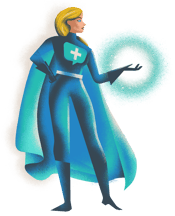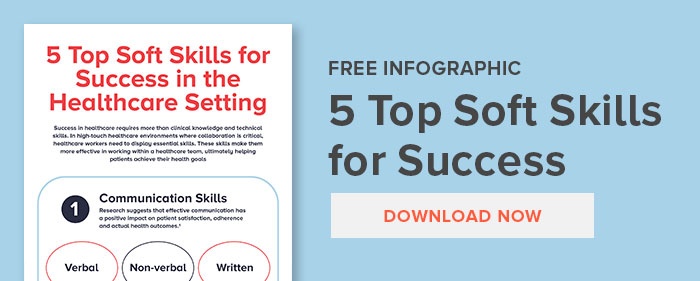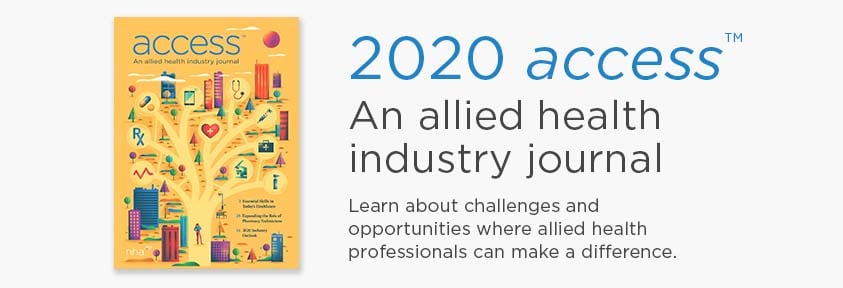Some healthcare employers now prioritize soft skills as more essential traits for new hires to have than clinical knowledge or technical skills.
Are the healthcare workers in your training program prepared to leverage interpersonal skills in the medical field for the best patient outcomes? The line between soft skills versus hard skills in healthcare is blurry, and some employers are putting more emphasis on the soft skills during the interview process.
Soft skills are healthcare skills, plain and simple.
Soft skills are a predictor of how effective training for hard skills will be. Most healthcare employers define soft skills as how employees think and act. Those who manage staff understand that soft skills hold the potential to impact the patient experience just as much as what employees know.
Inspire your healthcare students and employees to improve their soft skills for career success with the NHA PersonAbility™ Power Squad.
Each of these soft skills superheroes excels in a particular area that’s crucial to positive patient outcomes on the frontlines of healthcare. Download the PersonAbility™ Power Squad poster and read their summaries below to help your trainees recognize the importance of developing great soft skills in the healthcare industry.
Which essential soft skills could your team use some encouragement to develop?
 Adaptability
Adaptability
Captain Adaptable’s ability to stay calm in the face of the unexpected makes him resilient and helps him find new ways to approach challenges in the workplace. Priorities are constantly changing in healthcare. As new knowledge emerges or critical changes occur in a patient’s condition, he’s able to adjust his strategy effectively.
Communication
The Communicator’s incredible communication skills help her effectively convey important information that her patients and teammates need to know and want to know. She’s adept at verbally and nonverbally sharing essential information in a way that’s easily comprehended by others.
 Dependability
Dependability
Mr. Dependable can be trusted to bear heavy loads. His teammates have peace of mind that he’ll perform all work as promised. He fits into the workplace culturally and follows through on his obligations to patients and coworkers.
Active Listening
The Listener practices active listening, so that she’s able to observe and interpret others’ behavior and body language to gain a more thorough understanding. This makes her more likely to understand tasks, build strong relationships with her teammates, and give the task at hand her undivided attention. Her patients and team feel heard and respected.
 Empathy
Empathy
The Empress of Empathy creates an environment of trust and emotional support that allows the patient to feel heard. Her empathy and compassion lead to better medication adherence, fewer mistakes, and increased satisfaction for her patients.
Teamwork
The Teamwork Twins combine their experience. By merging their skill sets, they’re able to take action together to solve problems. They support one another, and both benefit from their partnership.
How to teach your students or employees to channel the PersonAbility™ Power Squad and their super-human soft skills:
The characteristics of soft skills make them seem daunting or impossible to “teach”. After all, it’s difficult to quantitatively measure someone’s empathy or listening skills. The process takes time, and greatly depends on the willingness of trainees to embrace a new growth mindset. Developing soft skills in the workforce can be a special challenge, since it often requires adjusting the existing culture of the workplace.
Whether you’re an allied health educator seeking to boost your students’ hireability or a healthcare employer working to improve patient outcomes and uplift the culture of your organization, here are some steps you can take to get started with teaching soft skills:
Step One: Demonstrate relevance.
If you have any experience educating healthcare professionals, you’re already aware: relevance is key. Time is limited for adult students with full plates, and educational programs are often fast paced. Students must prioritize their attention.
Knowing why or when a skill will be useful in the future is a powerful motivator to stay focused. You can achieve this with videos or class discussions that demonstrate the poor outcomes that can occur when communication breaks down or a member of the team shirks their duties. You can also make this infographic below part of a homework assignment.
Step Two: Evaluate the group’s existing soft skills.
Incorporating soft skills into healthcare education requires assessment. Through a combination of self-assessment and 360-feedback, it’s possible to determine how well an individual’s perception of their own soft skills match up with others’ experience interacting with them. This can point to which areas they will need the most focused attention and coaching.
You can utilize this interpersonal skills self-assessment printable worksheet as a simple first step.
Step Three: Encourage a growth mindset.
Step Four: Provide soft skills education with plenty of opportunity to practice interpersonal skills.
NHA recently launched PersonAbility™, an interactive tool designed to build essential soft skills for a better future in healthcare. Highlights include virtual human simulations based on the science of learning and the art of conversation, role-play in a low-risk learning environment, and didactic content. PersonAbility™ helps healthcare professionals become soft skill superheroes capable of providing extraordinary care and building trusting relationships with patients and their team members.
(PersonAbility™ also offers a baseline soft skills assessment and final assessment to help validate your students’ or employees’ growth.)
Get a peek of PersonAbility™ in this training video:
Step Five: Recognize & Reward Progress
Praise healthcare professionals when they’re successfully emulating The Teamwork Twins or Captain Adaptable. Recognize them with a printable postcard highlighting one of the members of the PersonAbility™ Power Squad.
Healthcare education that goes beyond clinical skills and technical knowledge empowers healthcare professionals to provide the best in patient care and motivates them to become a positive part of the workplace culture. Soft skills are transferable skills in healthcare, which will serve healthcare professionals well, even if they shift specialties or employers. Investing in soft skills training leads to more efficient, effective healthcare teams and is well worth the reward for patients, employees, and employers.











